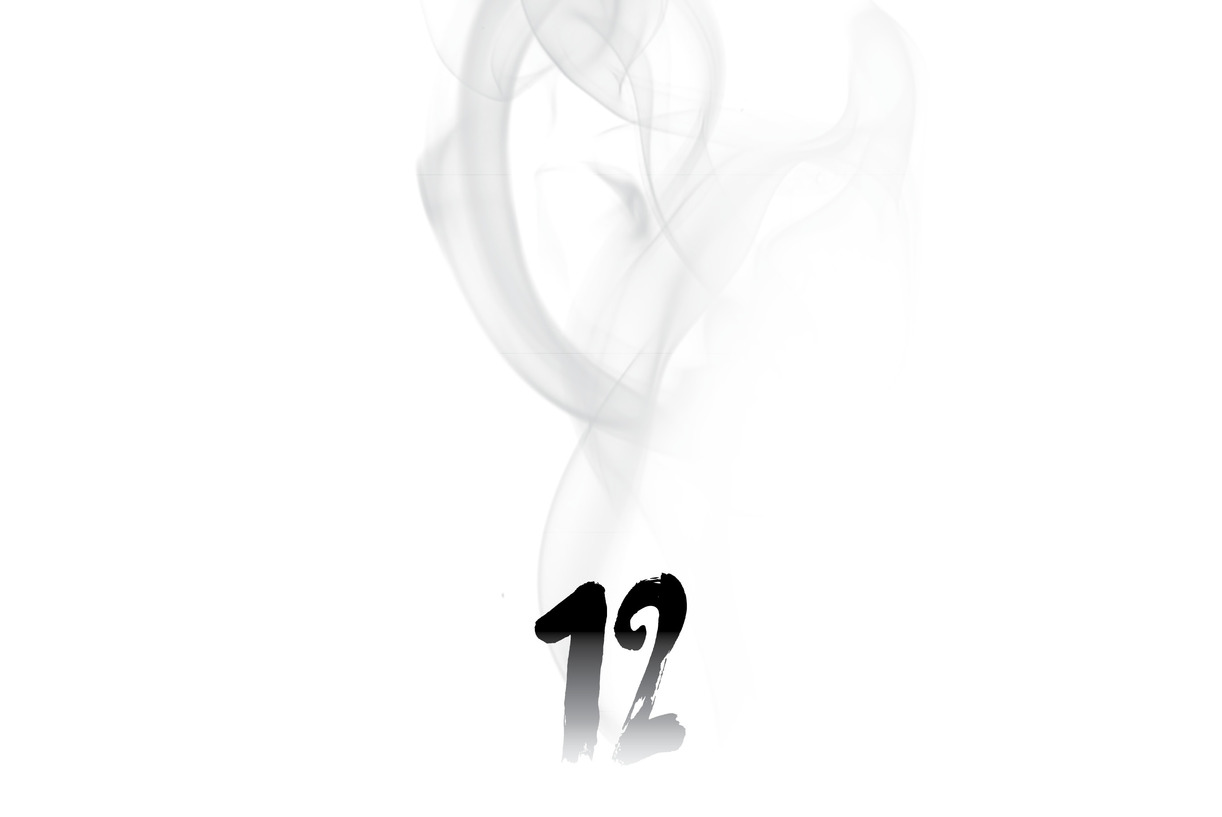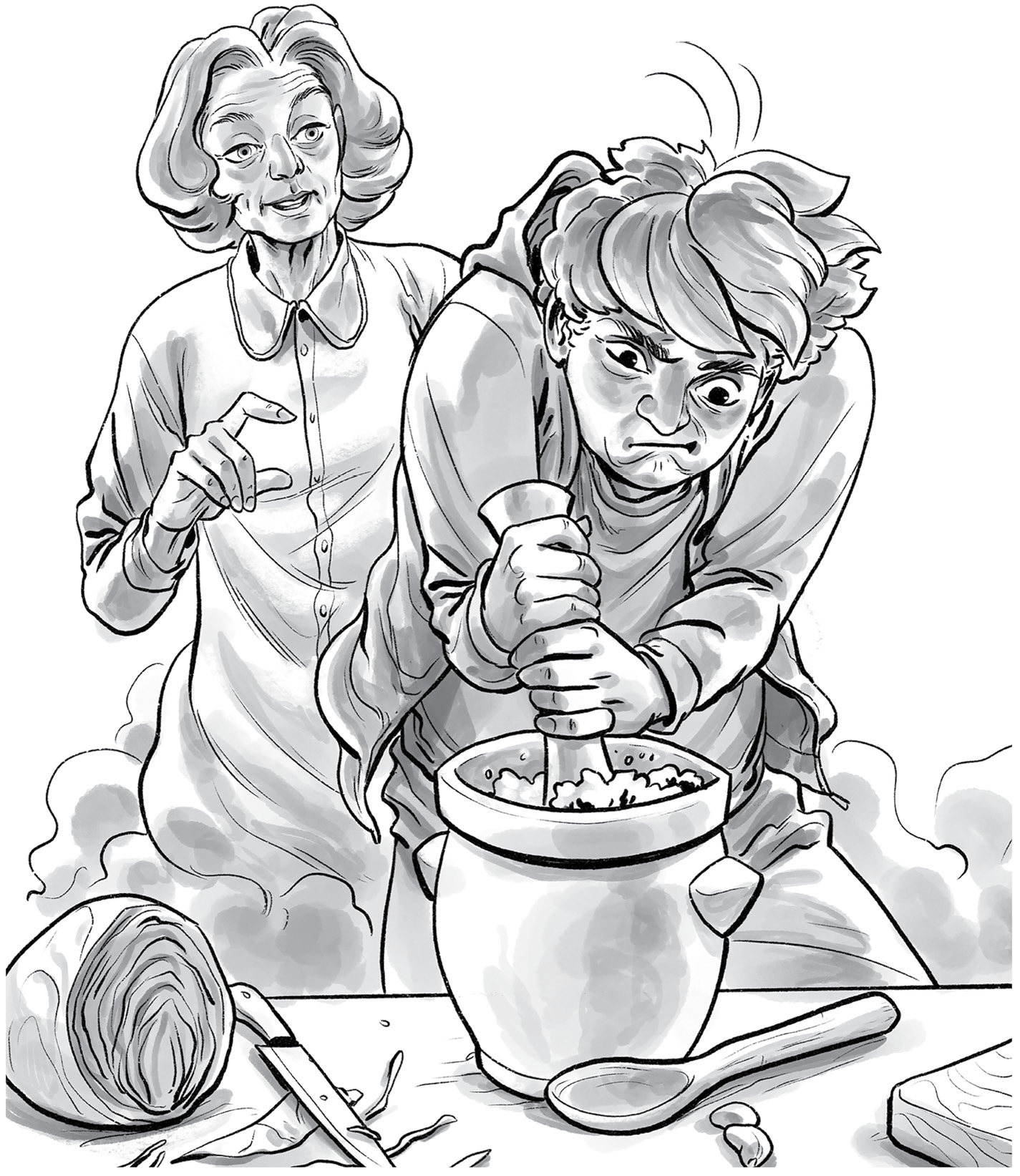
So I got out the kitchen scale and weighed all the cabbages and the salt, and measured all the juniper berries we had in teaspoons, and Eli made notes on the recipe about what we had when we started.
“Attention!” Eli said in his hockey announcer voice. “Folks, you are about to see Mrs. S. make her first sauerkraut in over fifty years—”
“These are good cabbages,” Oma interrupted, inspecting them carefully. “Tell your mother she has chosen well.”
“And…Mrs. S. compliments Mrs. Schenk on her choice of cabbages!” Eli cried.
Then Oma floated over and hovered next to him until he started washing them.
Once he’d handed the first one to me, Oma told me exactly which leaves I should pull off and set aside before I cut the cabbage. (They all looked the same to me, but it was her project, so I did it her way.)
“Mrs. S. puts the first cabbage chunk into the food processor…,” Eli announced. “She’s pushing the button…and…SLICED! She asks HD for an assist: Can they take the machine apart and see how the cabbage looks? The crowd holds its breath as Mrs. S. inspects the cabbage…and—SHE SAYS IT WILL DO! The crowd goes wild!” (Here, Eli played the part of the crowd going wild, until Mom stuck her head in and said that was enough, and could he put some music on?)
The food processor filled up fast. “Should I dump it right in the crock?” I asked.
“Yes, put it into the crock,” Oma said. “Now we sprinkle it with salt, and add the juniper, and mix it around.”
So I sprinkled salt in until Oma said to stop. Oma added the juniper berries herself.
“Now, mix it around, yes, with your hands—CLEAN hands! Now then, yes, like that.”
It felt like making a sandcastle out of crunchy seaweed. I let Eli pound it while I washed the salt off my hands.
When Oma told him to stop, the cabbage looked kind of wet, with little black juniper balls mixed in.

“Is it supposed to look like that?” I asked her.
“Yes, juice comes out of the cabbage and mixes with the salt, and that makes the brine,” she said. “More cabbage, please!”
So I cut up the next cabbage. Since he’d finished washing all the cabbages, Eli made us all iced teas with lemonade, including the ghost, so she wouldn’t feel left out. We sipped our drinks while Oma sliced the cabbage and sang along with Ella Fitzgerald, when we could hear the music over the food processor. It turned out Oma had listened to her back in her day too.
Eli made up a tap dance for “Mack the Knife,” and we all clapped and cheered, until he crashed into the table and Mom stuck her head in again and suggested he take a break.
Every few minutes, the food processor would fill up, and Oma would hover over me and remind me what to do while I dumped the cabbage into the crock and added salt, even after I told her that thanks, I thought I’d got the hang of it. Then she’d add the juniper, and Eli and I would mix and pound it.
When I cut up the last cabbage, Eli started announcing again. “HD passes the last cabbage chunk to Mrs. S.! Mrs. S. drops the cabbage straight into the chute—she’s pressing the button now—and GOAL! All the cabbage is sliced! Now it’s back to HD. He dumps the cabbage into the crock—he sprinkles it with salt—Mrs. S. adds her special ingredient—HD mixes it up—and Eli picks up the kraut pounder and starts pounding it—yeah, carefully, I know. Mrs. S. tells HD to put the cabbage leaves on the very top and…the crowd waits to see what Mrs. S. thinks.”
Oma was examining the crock. It was almost full of cabbage and salt. Mom was right: that was going to be a lot of sauerkraut.
“We will check it again tomorrow. If enough juice has not come out of the cabbage, we must add brine made with water,” Oma said. “The cabbage must be covered in brine, or mold could form.”
“Got it,” I told her. I picked up the box of salt and weighed it again. I wrote down the current weight, then subtracted it from our starting weight, so I could write down how much salt we’d actually used. Then I measured out the juniper berries, and subtracted that from the original amount too. Oma might be a sauerkraut expert, but I thought the judges might want real measurements.
“Can I see?” Mom asked, coming in and peeking into the crock.
Oma smiled. She floated over and got the pencil and paper. Do you make sauerkraut?
Mom said, “No, but—”
Then I heard Dad’s Fiat pull up into the driveway. “Um, Oma, do you think it’s making enough brine?” I asked her, poking the cabbage leaves with the kraut pounder.
Mom slipped out of the kitchen.
I heard the front door open.
“Not yet,” Oma told me. “It may take longer. Put the lid on now, and fill the channel with water, so the sauerkraut can breathe but mold cannot get inside.”
“Uh, I don’t think this cabbage is still alive,” Eli said as I carefully set the lid into the groove around the top of the crock. “Not after we cut it up and pounded it. How can it breathe?”
“As the cabbage turns to sauerkraut, gases will form,” Oma explained. “The gases float up around the lid, through the water in this channel—yes, pour it right in here, Hans Dieter—stop! Not so much it overflows! Yes, exactly like that.”
“It’s like a moat, but for sauerkraut,” Eli said. “The lid sticks up out of it like a castle, and the sauerkraut waits down in the dungeon underneath.”
“No, no, the sauerkraut is down in the treasure vault,” Oma corrected. “The mold tries to break into the sauerkraut, but it cannot get in through the water.”
Mom was telling Dad and Asad something in the other room, but I couldn’t hear what she was saying, what with Eli and the ghost discussing what a mold-knight versus water-knight battle would look like.
“I want to see!” Asad yelled, and ran into the kitchen. Then he stopped.
Mom and Dad followed him in. Dad was looking around, but his eyes didn’t stop on the ghost.
Asad looked right up at the ghost, who was floating next to me, waiting exactly like Mom had asked her to. “You don’t look like my grandmom at all.”
So, fine. Asad could see the ghost, and he wasn’t freaking out the way I had when I first met her. Even my little brother would make a better Man in Black than I would. “That’s because Grandmom Davis is Mom’s mom, not Dad’s mom. You probably don’t remember Grandma Schenk, because she moved away before you were born, and you were really little last time we saw her,” I told him. “Oma, this is my little brother, Asad Schenk.”
“How nice to meet you, Asad,” Oma said, smiling.
“We can call her Oma—it means ‘grandma.’ Although she’s actually our great-great-grandma. Got it?” I said.
“How come she gets to use the food processor?” Asad wanted to know.
I frowned at him. “Just because she’s a ghost doesn’t mean she can’t hear you, so be polite. She’s a lot older than you, and she knows how to be responsible, and not put things in the food processor that she’s not supposed to.”
Dad was staring at us, like he didn’t know what to say.
“Hi, Mr. Schenk,” Eli said. “Do you smell anything?”
Dad sniffed. “Cabbage?”
“Anything sweet?” Eli asked.
Dad sniffed again. “Maybe?”
“Great job!” Eli said, making a note. “That’s Mrs. S.’s violet soap.”
“Can you hear me, Hans Peter?” the ghost said, very softly.
“Did you hear anything, Mr. Schenk?” Eli asked.
Dad shook his head, looking from Eli to me, to Asad, to Mom.
“It’s okay, Dad,” I told him. “Oma just said hello to you.”
“Mrs. Schenk, could you please give Mrs. S. the pencil so she can say hello herself?” Eli asked Mom.
Mom held up the pencil and the notepad. She only flinched a tiny bit when Oma grabbed them. But, obviously, Mom’s brave. She was a soldier.
Oma: Hello, Hans Peter. It is nice to meet you.
Dad’s brave too, of course, same as Mom. He grabbed Mom’s hand for a minute, but he didn’t step back. And he only hesitated a little bit before he picked up the pencil that Oma had set down.

Dad: Nice to meet you too, Oma. My dad used to tell me stories about spending time with you when he was a kid.
Oma: He remembered me? What did he remember?
Dad: Well…I remember him telling me about the cakes you used to bake.
Oma: My Gugelhupf! He did like that, yes. But today we are making sauerkraut, not cake. Which do you prefer: sauerkraut or sauerruben?
Dad: What is sauerruben?
Oma: Your mother never made it? From turnips, instead of cabbage? You have this wonderful food processor and yet you do not make sauerruben?
Dad: Sorry. I guess not. My mother wasn’t much of a cook.
Oma: Hans Dieter and Eli and I will make you some, after we finish the sauerkraut.
Dad: Thanks, I guess. It’s nice to have you here, Great-Grandma. So—how long are you planning to stay?
Oma didn’t bother to answer that one. Or maybe she didn’t know.
“Come see what your brother and his friend have helped me make,” Oma told Asad, floating over.
“Can you pick me up?” Asad asked the ghost.
“I don’t think that’s a good idea,” Mom said, in the voice that means “no way, nohow.”
“Here, check it out.” I picked up Asad, and carefully lifted the lid. It made a burping noise when it came out of the water.
Asad giggled. “Excuse YOU, Grandma!”
Oma smiled and shook her head.
“Hey, Oma, there’s more brine now,” I told her, looking in.
Asad peered into the crock. “What is that going to be?”
Oma beamed. “It will be my famous sauerkraut! It will win the county fair!”
Asad sniffed it, and made a face. “I’m not eating that.”
“Yeah, you might be too little to appreciate it,” I said, and set him down. Something told me that Oma wasn’t going to be telling Mom and Dad how helpful Asad was.
“Now, Hans Dieter, we must put a plate on top of the cabbage leaves—no, that one will not fit in the crock—yes, like that, and one more on top. Put it in—ah, yes, that will weigh them down, so the cabbage stays under the brine….”